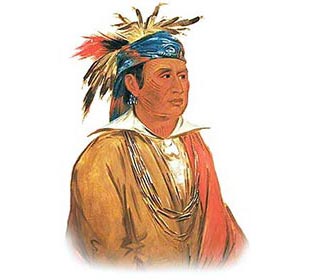Fast Facts about the History of Michigan Indians
The climate, land, history, environment and natural resources that were available to the indigenous Indian tribes in Michigan resulted in the adoption of the Northeast Woodlands culture. - Name of State: Michigan
- Meaning of State name: From the Indian word “Michigamea, meaning “Great Water.”
- Geography, Environment and Characteristics of the State of Michigan: Hills, level land with swampy areas, the western region is higher and more rugged
- Culture adopted by Michigan Indians: Northeast Woodlands Cultural Group
- Languages: Iroquoian and Algonquian
- Way of Life (Lifestyle): Hunter-gatherers, farmers, fishers, trappers
- Types of housing, homes or shelters: Chickees, Wigwams (aka Birchbark houses) and Longhouses
History Timeline of the Michigan Indians - 10,000 B.C. : Paleo-Indian Era (Stone Age culture) the earliest human inhabitants of America who lived in caves and were Nomadic hunters of large game including the Great Mammoth and giant bison
- 7500 BC: Eastern Woodland Culture of Fisher Hunters begins. Permanent houses and farming
- 7000 BC: Archaic Period in which people built basic shelters and made stone weapons and stone tools
- 4000 BC: Old Copper culture begins in the Great Lakes region in which native copper was utilized to produce a wide variety of tools axes, adzes, arrow head points, knives, fishhooks and harpoons
- 1622: Etienne Brule (1592-1632) and a French-Huron reach Michigan
- 1634: Jean Nicolet explores Lake Michigan for France
- 1763: 1763-1675 -- Pontiac's Rebellion, Chief Pontiac's tries to force British out of the West, Michigan, New York and Pennsylvania.
- 1763: Treaty of Paris
- 1775: 1775 - 1783 - The American Revolution
- 1776: July 4, 1776 - United States Declaration of Independence
- 1803: The United States bought the Louisiana Territory from France for 15 million dollars for the land
- 1812: 1812 - 1815: The War of 1812 between U.S. and Great Britain, ended in a stalemate but confirmed America's Independence
- 1819: The Treaty of Saginaw cedes nearly 6 million acres of Indian lands to Michigan settlers forcing them farther West
- 1830: Indian Removal Act
- 1832: Department of Indian Affairs established
- 1832: Black Hawk War occurred in Northern Illinois, Michigan, Southwestern Wisconsin including the Battle of Bad Axe - see Black Hawk
- 1837: Michigan admitted to the Union
- 1861: 1861 - 1865: The American Civil War.
- 1862: U.S. Congress passes Homestead Act opening the Great Plains to settlers
- 1865: The surrender of Robert E. Lee on April 9 1865 signalled the end of the Confederacy
- 1887: Dawes General Allotment Act passed by Congress leads to the break up of the large Indian Reservations and the sale of Indian lands to white settlers
- 1969: All Indians declared citizens of U.S
- 1979: American Indian Religious Freedom Act was passed
Black Hawk History of Michigan Indians - Destruction and Decline
The history of the European invasion brought epidemic diseases such as tuberculosis, cholera, influenza, measles and smallpox. The Native Indians of Michigan had not developed immunities against these diseases resulting in huge losses in population. Exploitation including the leverage of taxes, enforced labor and enslavement were part of their history, taking their toll on the Michigan Indians. |
